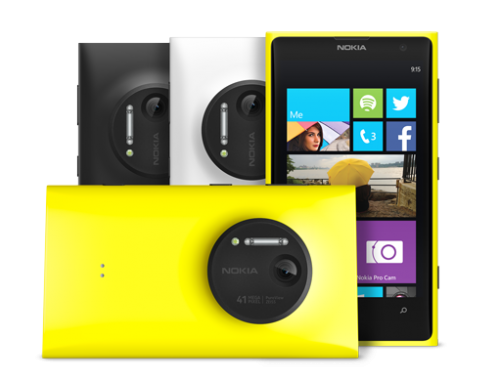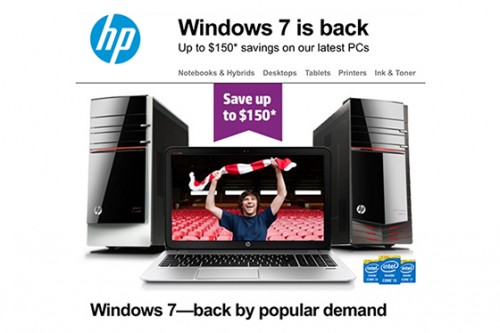 It seems everyone who reviews Windows Phone 8 loves it, they just “aren’t in love with it”. And Nokia Q4 2013 sales figures show a product category limping so badly it couldn’t eek out a sales gain during the recent holiday quarter. No doubt Microsoft will keep pushing Windows Phone, but is that enough?
It seems everyone who reviews Windows Phone 8 loves it, they just “aren’t in love with it”. And Nokia Q4 2013 sales figures show a product category limping so badly it couldn’t eek out a sales gain during the recent holiday quarter. No doubt Microsoft will keep pushing Windows Phone, but is that enough?
Hardware partner Hewlett-Packard is publicly signaling Windows 8 demand is not increasing either with their “by popular demand” Windows 7 advertisements spotlighting the “return” of Windows 7 as an operating system choice for new buyers.

So if Windows 8 is tanking, and Windows Phone is struggling to grow, what’s the prognosis?
It’s unlikely Windows Phone will go away entirely; Microsoft surely recognizes the importance of mobile. However, it’s been over a year since Windows Phone 8 was released in October 2012. As an owner of a Nokia 928, I don’t see the type of steady progress in the application catalog which normally signals more widespread acceptance (even BlackBerry has taken a pass on building an app for Windows Phone).
Sure Nokia/Microsoft have taken the “beautiful camera” approach to marketing the Lumia 1020, but you know what? Beautiful cameras are a dime a dozen. And judging from Nokia’s recent sales figures, the marketplace agrees.
It’s time to admit that both Windows 8 and Windows Phone are failing. Not in a “going out of business” type of way, but in a “not high on my kids’ wish list” type of way. Windows 8 is seen as a necessary evil to upgrade in the workplace, but as signaled by HP’s “back by popular demand” campaign, the new OS does not seem to have caught any momentum with home users.
Here are a couple of suggestions for Microsoft:
Make XBox Music free but only on Windows Phone. My daughter loves this service so much she carries an unactivated Nokia 920 with her just for the music (she has an iPhone 5C too). Yes this will cost Microsoft money, but once Microsoft gets people hooked they can gradually up the price (see Microsoft Office history for details on how they did this).
Instant Messaging is the new email. Microsoft failed miserably with their message applications on Windows Phone 8. The Facebook Messenger integration does not sync messages as similar apps on iOS and Android do. The integration to Skype is through a separate clunky app and not the main messaging application. They need to fix this now.
Windows Phone needs to own the sub $200 (contract free) marketplace. The trend in North America is toward contract free. T-Mobile started that trend, and AT&T is picking up on it; other carriers will follow. Most consumers are not going to pay $750 off-contract for the latest Samsung. Microsoft has an opportunity to further jump into this space by getting their Lumia 9xx type phones down in the sub $200 off-contract price range. This should happen ASAP, before Samsung and Apple know what hit them.
Get Rid Of Metro as a start screen on the Windows desktop. Throw all the phone type apps into the Metro interface, but don’t force office workers to boot into Metro. This sounds like what Microsoft may eventually do; this should have been the plan from the start.
Is it too late for Microsoft? In the short term, yes. Surely they are making money hand over fist, though largely that seems to be from areas such as Microsoft Office where corporations have no realistic alternative than to keep renewing their licensing. However Microsoft needs to move beyond the “we don’t have any choice but to pay” into the “we will gladly pay” market. So far they’ve not found that spot. Hopefully they can before their market share deteriorates further.

Not disagreeing, but interesting news this morning as part of MS Earnings report is that the Surface division has seen revenues more than DOUBLE. Of course, coming from abject failure and a $900 million write-off that doesn’t mean as much, but the Surface 2 and Surface Pro 2 seem to be getting some traction.
As does the tablet oriented Windows 8 machines like the Dell Venue 8 Pro and the Asuss Transformer Book T100. IE: The new netbooks. These both run full Windows 8 and while the interface is still the wonky weird Windows 8 one, it makes much more sense on these touchscreen based devices.
Microsoft COULD definitely turn it around if it does some of these things though. I’d change it so RT(arm based) is ONLY Metro style and bring the desktop back.
I have to disagree with the “Windows Phone is struggling to grow” comment. Yes, Nokia’s sales for the 4th quarter are less than a year ago, BUT their overall sales for the year are more than double the previous year. From just under 9million to 30 million – that’s not struggling to grow. One bad quarter doesn’t spell the end, especially when it’s routinely reported as the fastest growing platform.
I won’t disagree that there are many things that Microsoft and Nokia can do to improve and better position Windows Phone 8 and increase consumer demand. Some of your suggestions are pretty good, but it’s not on it’s death bed. Far from it.
Agreed – I think Microsoft has enough money to prop WP8 indefinitely. Especially now that they were essentially forced to buy Nokia (the only major viable phone mfg to develop for WP8 and only after heavy subsidy).
The problem with WP8 is that it came out of the gate half baked. All the things I talked about were major disappointments to me. And I didn’t even get into the Live Tiles — which in my experience largely do not work (and this is supposed to be WP8 MAJOR selling point). And the notification system (or lack of) is so obvious that you just scratch your head wondering.
I also think Microsoft tried to pull a fast one by implying that there was tighter integration between WP8 and Windows 8. The connection is sparse aside from screen graphics.
I’m more disappointed because I want to use WP8 but cannot find anything to expand my use.
I just recently dropped iPhone in favor of Android. That switch could just as easily have been to WP8 but there was no compelling reason to go to WP.
Its funny, but I’ve found no compelling reason to switch to Android. I’ve tried it a few times and never found it all that useful or compelling to me so I keep going back an forth between an iPhone and a Windows Phone.
I don’t think the ideas I’ve heard about turning it into another Android phone are sensible either. The last thing we need is another Android fork.
Here’s some things I think would help Windows phone:
* Get more large format devices like the Nokia 1520 out there and make apps work correctly with the larger screen sizes. The bigger format would make the Office app more useful.
*Along with that get BT keyboard support and print support working. It’s crazy that this OS doesn’t support either of those things at this stage of it’s life.
* Get more apps out there and improve the apps that are out there already – especially games. Games help sell devices – like it or not – and WP is woefully behind in this arena. Where are all the casual games from EA and Zynga and others? The few that are out there are often terrible ports (like the unstable “Words with Friends” port). These things lead people to view the platform as a second-class citizen in the mobile arena and until fixed, will continue to dissuade new users.
Having said all this, I continue to use the platform and even added the new 1520 to my collection. It’s a great device even with the limitations, but MS really needs to step up their game if they want to have any hope of ever making the platform more than a niche.
I have a couple of ideas for Windows Phone 8, although they are a bit out there. First of all, I’m very much in favor of Microsoft’s work to combine Windows Phone and Windows RT into a single OS. That would should continue as quickly as possible so that Windows Phones can run Windows applications. That will be a huge selling point for both platforms. But I think they need to take it a step farther, since the Windows Store is also lacking in apps. I’d take the somewhat controversial approach and build a library to support running Android apps on Windows Phone. Yes, I know that this could kill the Windows Phone app market, but it’s already limping along, and I’d hope that letting Windows apps run on the phone would help prevent that. But I’d take it a step further and revive the old Microsoft practice of “Embrace an extend”. That is, I’d add some libraries to Android that would let those apps take advantage of Windows Phone features, like the panoramas, hubs, and Live Tiles. That would prevent the WP phones from being “just another Android” phone. I doubt they’ll ever do this, but it seems clear that they need to do something.
>don’t force office workers to boot into Metro. This sounds like what Microsoft may eventually do; this should have been the plan from the start.
…If by “may eventually” you mean “three months ago”, sure:
1) Right-click on desktop taskbar, click on Properties.
2) Click Navigation
3) Under the “Start screen” section,check “When I sign in or close all applications on a screen, go to the desktop instead of Start.”
And yes, Boot to Desktop is something that can done via Group Policy, so neither office worker nor sysadmin will have to manually enable it one by one.
>Is It Time to Stick a Fork in Windows Phone 8?
According to Betteridge’s Law of Headlines, the answer is “No.”